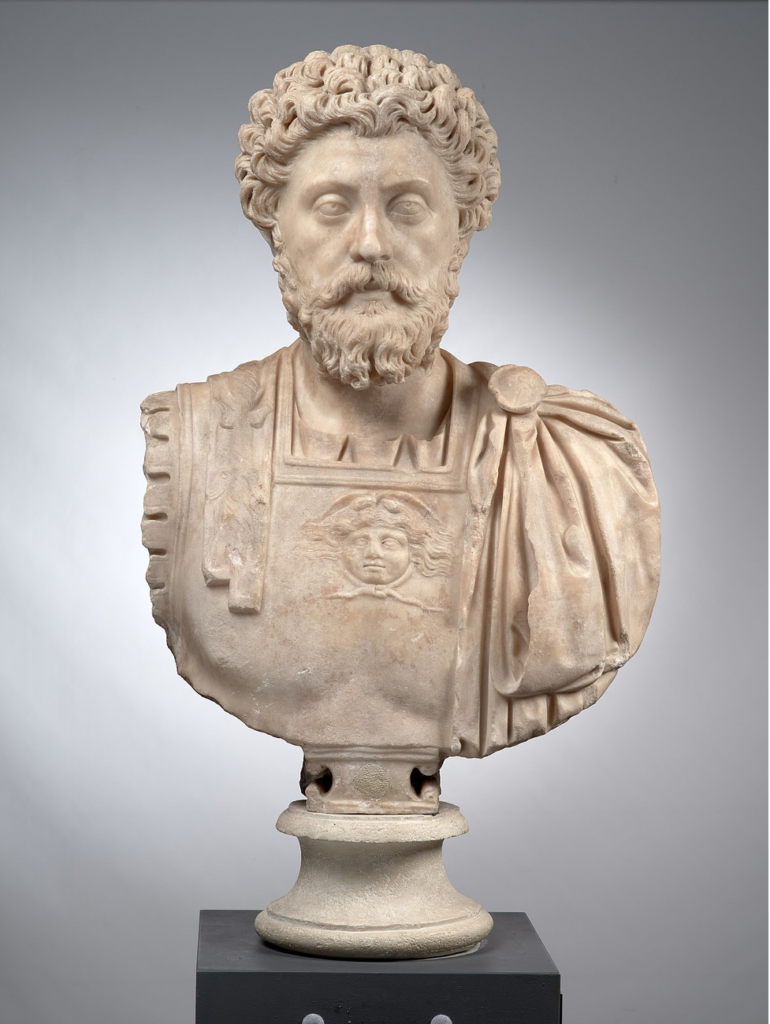Clay County Histories

Emperor Marcus Aurelius
Markus Krueger | Program Director HCSCC
Back in the late 1990s, Mr. Gigstad, my Social Studies teacher at Moorhead High, nicknamed me Marcus Aurelius after Rome’s philosopher emperor with whom I share a first name. Marcus Aurelius ruled the Roman Empire from 161 to 180 AD, but his more lasting accomplishment is writing probably the most popular book ever on stoic philosophy. After all these centuries, Meditations by Marcus Aurelius is the second highest selling book to come out of the Roman Empire (the first being a one-volume compilation of books written by Matthew, Mark, Luke and John, etc.).
In Meditations, a Roman emperor lays out sage wisdom for how to stay strong while taking life as it comes, how to keep things in perspective, and how to be a good person. I can picture the smirk on Mr. Gigstad’s face (he was a good smirker) if I were able to tell him that I am always reading Marcus Aurelius’ book. I collect copies. I read a few lines most days, and when I finish it, I start over again.
Marcus can come off as judgmental and strict, but what I like best about this book is that he didn’t write it to tell other people how to live. This is Marcus’ book of advice to himself, for himself, found and copied after he died. Meditations is the compiled private thoughts of someone struggling to do better. I imagine Marcus sitting alone in his palace at the end of a long day of schmoozing with slimy Senators, or in a tent after a bloody fight with my barbarian ancestors…
Marcus, calm down, he wrote: “Choose not to be harmed, and you won’t feel harmed. Don’t feel harmed, and you haven’t been.”
Marcus, don’t let them get to you: “Think of what men are. Who they care to please. What they gain by it. What they do for it. How soon time will bury all. How much it has buried already.”
Marcus, you dummy: “No more talking of what the good man should be. Be it!”
Sometimes Marcus is in a dark mood, like when he reminds himself “not to live as if you had endless years ahead of you. Death overshadows you. While you’re alive and able, be good.”
But there’s also confidence: “Let not the future perturb you. You will face it, if so be, with the same reason which is yours to meet the present.”
Optimism: “And then you might see what the life of the good man is like – someone content with what nature assigns him, and satisfied with being just and kind himself.”
And warnings: “Never regard something as doing you good if it makes you betray a trust, or lose your sense of shame, or makes you show hatred, suspicion, ill will, or hypocrisy, or a desire for things best done behind closed doors.”
I wouldn’t ask Marcus Aurelius for advice on car repair, but some aspects of being human don’t change. Cavemen and Roman Emperors and me and you all try to do the right thing and be decent people in spite of everything that gets thrown at us. “Life is more like wrestling than dancing,” Marcus says, “You must be ready to keep your feet against all onsets, however unexpected.”

